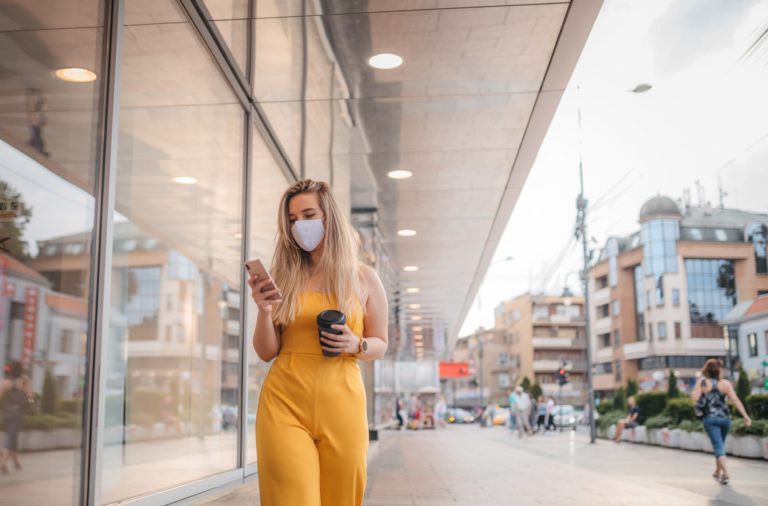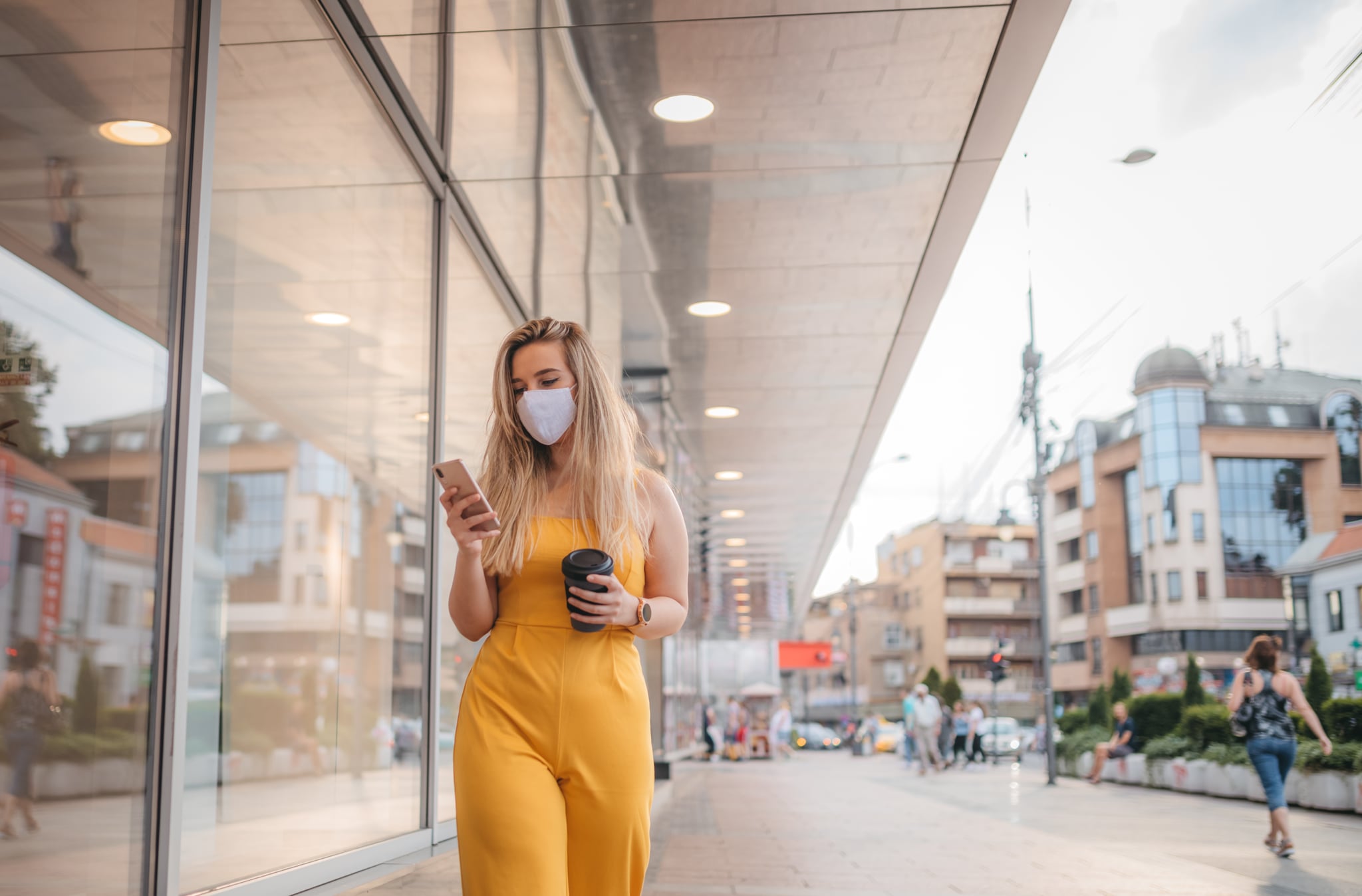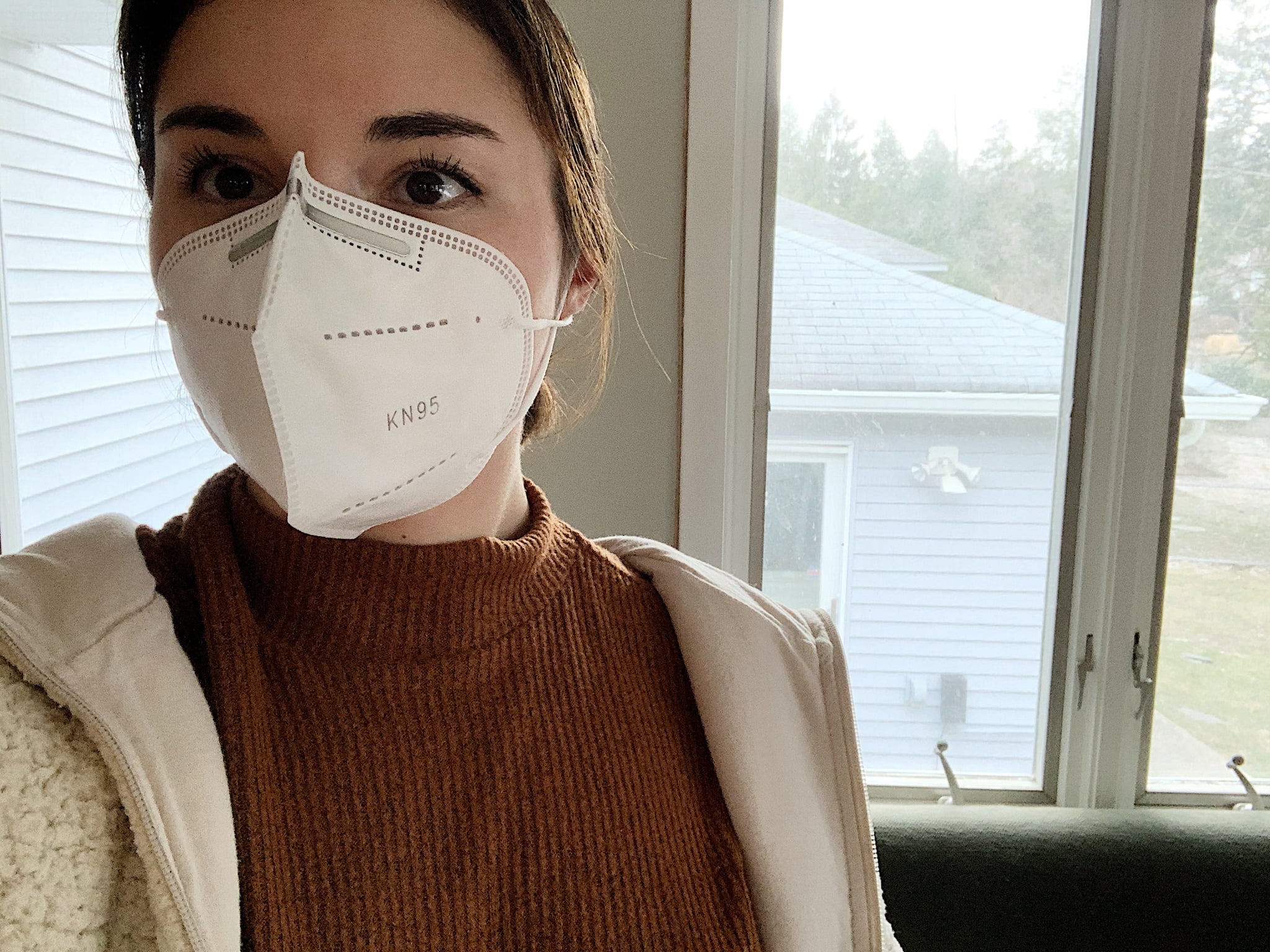

Image Source: Getty / Nenad Stojnev
Guidelines for mask wearing have changed throughout this pandemic; however, one concept has stayed the same: wearing a mask can slow down the spread of COVID-19. While the World Health Organization and the Centers For Disease Control and Prevention both advise the general public to leave medical-grade masks like N95 respirators to healthcare workers, some experts worldwide are challenging that claim and advocating for premium mask use given the increasing prevalence of more contagious COVID-19 variants. This includes the use of KF94 masks, but what are they exactly?
What Are KF94 Masks?
KF94 masks are premium face masks made in South Korea — and Sonali Advani, MBBS, assistant professor of medicine at Duke University, told NPR that the “KF” in “KF94” stands for “Korean filter.” According to The New York Times, it blocks 94 percent of viral particles (hence the “94” in “KF94”). It has ear loops like a cloth face mask and is disposable. Although it can be reused, The New York Times reports that it won’t last as long as cloth masks. And, these medical-grade KF94s are actually widely worn by the public in Korea. The YouTube video below showcases how to put on the KF94.
Epidemiologist Eric Feigl-Ding, MD, ScD, an adjunct senior fellow with the Federation of American Scientists, wrote on Twitter, “Personally I find the South Korean KF94 very comfortable. The KF94 creates a bigger gap in front of your mouth to speak clearly. And I sometimes forget I’m even wearing it because it doesn’t touch my lips or corner of my mouth.” He added that it has a folding system by your nose and chin — what NPR describes as “side flaps.” NPR also describes it as a “mash between an N95 and a typical cloth mask.”
What Is the Difference Between the KF94 Mask and N95 Mask?
A KF94 is reportedly equivalent to the N95 respirator, but more available. It won’t fit as tightly to the face as N95 masks do — plus N95s, as the name suggests, have 95-percent filtration instead of 94. One very small study published in August 2020 concluded that the KF94 and N95 mask both efficiently blocked SARS-CoV-2 particles from spreading when COVID-19 patients coughed.
This study did not test filtration in the other direction — the effectiveness of protecting the wearer from viral particles coming in — though medical-grade masks are, in general, said to be the gold standard when it comes to protecting the wearer from airborne viral particles when they inhale. These medical-grade KF94s are being used by the public in Korea, and Purvi Parikh, MD, an immunologist and allergist with Allergy & Asthma Network, told POPSUGAR that N95 masks, KN95s (which we highlight below), and surgical masks continue to be the go-to medical-grade masks used in healthcare settings in the US. (Note: two nurse friends of mine wear N95s at work, and one said she makes sure to wear her N95 while treating COVID-19 patients specifically.)
What Is the Difference Between KF94 and KN95 Masks?
KF94 masks have 94-percent filtration efficiency, and the other, KN95, is advertised as having 95-percent filtration efficiency. The KN95 is essentially an N95 mask that meets the standard in China. The FDA granted, then reissued, emergency use authorization for KN95 masks in the US, but some KN95 masks were actually shown not to be as effective filtration-wise as N95 masks (so, healthcare professionals should only use ones clearly approved by the FDA). As we mentioned, KF94 masks have ear loops and many KN95 masks also have ear loops, as opposed to the elastic head bands of N95 masks.

Image Source: POPSUGAR Photography / Sam Brodsky
Where Can I Get KF94 Masks?
While Dr. Feigl-Ding said he directly orders KF94 masks from South Korea, they are available on Amazon in packs ($40). However, be wary of knockoffs. As he and other experts have pointed out, there are counterfeit ones being sold online. Stephen Morse, PhD, an epidemiology professor at Columbia University, told NPR that people should always stick to KF94 masks that are manufactured in Korea.
Are KF94s Better Than Cloth Masks?
KF94s are better than cloth masks in terms of filtration and protection from airborne viral particles — after all, they’re medical-grade masks — but you can still wear cloth masks, which continue to be recommended for everyday use in the US. “To be clear, cloth masks do work, too, just to a lesser degree,” Dr. Feigl-Ding said, especially when it comes to filtering your own viral particles (though there is growing evidence that even cloth masks can protect the wearer to a degree).
Dr. Advani told NPR, “When it comes to use in day-to-day activities, overall surgical masks and three-layered cloth masks perform pretty well.” Dr. Parikh told POPSUGAR that you may want a “higher-filtration mask for higher-risk activities, like public transport or grocery shopping.” She stressed that medical-grade masks should be reserved for patients with compromised immune systems, healthcare workers, and essential workers. “The general public should be fine with triple-layered [cloth] masks,” she said. “What will protect most is distancing and avoiding large gatherings, especially indoors.”
So, as it stands right now, if you’re sticking to cloth masks, look for multilayered ones, and still rely on social distancing practices when around others. If you’re going to purchase KF94s, choose wisely, staying away from options that are not manufactured in Korea.
POPSUGAR aims to give you the most accurate and up-to-date information about the coronavirus, but details and recommendations about this pandemic may have changed since publication. For the latest information on COVID-19, please check out resources from the WHO, CDC, and local public health departments.